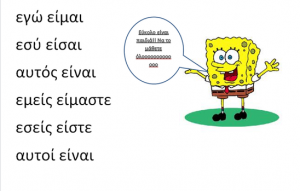Difference between revisions of "Language/Modern-greek-1453/Grammar/Verb-To-Be"
< Language | Modern-greek-1453 | Grammar
Jump to navigation
Jump to search
(Replaced content with "thumb|none ==The verb== The verb is the word that undergoes the greatest number of modifications. It marks the action, the time, the voice, the person, the number and mode. The auxiliary verb "to be"") Tags: Visual edit Replaced |
|||
| Line 1: | Line 1: | ||
[[File:431254.png|thumb|none]] | [[File:431254.png|thumb|none]] | ||
In today's lesson, you'll learn how to conjugate the verb "to be" in Greek. | |||
==Greek Verb “To Be” in the Present== | |||
εγώ είμαι | |||
εσύ είσαι | |||
αυτός-ή-ό είναι | |||
εμείς είμαστε | |||
εσείς είστε | |||
αυτοί-ές-ά είναι | |||
==Greek Verb “To Be” in the Future== | |||
εγώ θα είμαι | |||
εσύ θα είσαι | |||
αυτός-ή-ό θα είναι | |||
εμείς θα είμαστε | |||
εσείς θα είστε | |||
αυτοί-ές-ά θα είναι | |||
==Greek Verb “To Be” in the Past== | |||
εγώ ήμουν | |||
εσύ ήσουν | |||
αυτός-ή-ό ήταν | |||
εμείς ήμασταν | |||
εσείς ήσασταν | |||
αυτοί-ές-ά ήταν | |||
Revision as of 22:54, 2 December 2022
In today's lesson, you'll learn how to conjugate the verb "to be" in Greek.
Greek Verb “To Be” in the Present
εγώ είμαι
εσύ είσαι
αυτός-ή-ό είναι
εμείς είμαστε
εσείς είστε
αυτοί-ές-ά είναι
Greek Verb “To Be” in the Future
εγώ θα είμαι
εσύ θα είσαι
αυτός-ή-ό θα είναι
εμείς θα είμαστε
εσείς θα είστε
αυτοί-ές-ά θα είναι
Greek Verb “To Be” in the Past
εγώ ήμουν
εσύ ήσουν
αυτός-ή-ό ήταν
εμείς ήμασταν
εσείς ήσασταν
αυτοί-ές-ά ήταν
